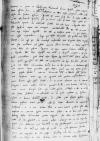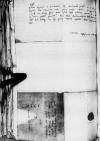Letter #40
Johann LEHMANN to Ioannes DANTISCUS[Wittenberg], [ca. 1536-09-08]
| received [1536]-11-01 Manuscript sources:
| ||||
Text & apparatus & commentary Plain text Text & commentary Text & apparatus
Multis praeclaris artibus virtutibusque ornatissimo Domino, domino
Gratiam et pacem in Christo etc. Reverende Domine Praesul.
Quam magna laetitia affectus sim et quam voluptatem ex litteris vestris acceperim, nullo modo eloqui aut scribere possum. Primum enim certior factus sum de vestra incolumitate, Reverende Praesul, quae ex animo mihi est cara atque grata, ac vehementer optarim, ut huiusmodi nuntius vel tales litteras a Dignitate Vestra quam saepissime accipere mihi contingeret.
Quemadmodum etiam ego, cum ex amore meo erga Vestram Dignitatem, tum etiam ex Christiana pietate et pro sanguinis nostri necessitudine semper pro Vestra Humanitate soleo precibus meis Deum sollicitare, ut ipse pro sua immensa misericordia velit Dignitati Vestrae ea praestare, quae conducant ad gloriam Nominis Divini immortalem et utilia corpori et animae vestrae esse possint. Praeterea me etiam maxime hilarem reddidit, quod a Dignitate Vestra cf.
Quae vestra adhortatio, ut maxime est Christiana et a meo fautore summo et amico maximo profecto quam lubentissime et maxime grato animo eam suscepi , ut decet meam aetatem, habeoque Vestrae Humanitati gratias ingentes ac velim, ut Vestra Humanitas id sibi persuadeat et penitus credat. Etiamsi hic in his regionibus passim sint Suermeri (ut vocantur) et alii pseudoprophetae, me tamen adhuc (laus sit Deo) iam habere eum animum, ut nullos phanaticos spiritus amem aut magnifice de illis sentiam. Persuasique mihi hoc et induxi animum meum me numquam de vera doctrina sanctae et catholicae ecclesiae decessurum
aut declinaturum ad opiniones, quae cum vera religione pugnare videntur. Oro et Deum, ut ipse secundum magnam suam misericordiam me retineat in vera Christiana doctrina et in Christiana vita conservet. Nullum quidem adhuc de his rebus habeo intellectum magnum in hac iuvenili aetate. Quare neque me immisceo tam magnis controversiis theologicis, sed permitto istarum tantarum rerum curam tractationem doctoribus theologiae. Verum in illud unum diligenter incumbo, ut omnes malas opiniones de Deo et omnes hereticos fugiam (ut Christianum decet), et a natura illis sum inimicus, qui haereses spargunt et seminant in ecclesia. Ac vellem (quemadmodum spero futurum in consilio), ut in ecclesia esset unus pastor et unum ovile. Id quod ut fiat, Deus misericors implorandus est, ut in concilio adsit sua divina potentia et pacem ecclesiae restituat. Porro quod sapientia vestra, sicuti ego petieram, mihi fidele et sapiens consilium dat et me adhortatur et incitat ad studium bonarum artium et philosophiae, id quoque animo meo acceptissimum est, non solum ea de causa, quod mihi utile sententia tale consilium, verum etiam ea de re, quod cum studiis meis quadrat et convenit, quia ego me hoc anno (ita a praeceptore meo institutus) totum et penitus dedidi artibus dicendi perdiscendis et methodum moralis philosophiae a magistro
Praeterea quod scribitis Vos velle, si commode fieri possit, scholam erigere et reformare, quae cum sit utilis et necessaria propter doctorum virorum penuriam, lubens viderem, ut cum summa diligentia in hanc rem incumberetis tum propter honorem Dei, tum propter utilitatem totius provinciae Prussiae, ut bona schola erigeretur. Cum probably
His iam scribendo finem facere cogor ac unum tantum adhuc addam, quod mihi necessarium, ut scribam, esse videtur. Gratias habeo humanitati vestrae pro litteris ad me datis et pro fideli adhortatione, et pro vestro consilio. Commendoque me praeterea dignitati et benevolentiae vestrae, Reverende Praesul, ac oro obnixe, ut dignetur vestra humanitas mihi optima quaeque consulere. Si ego rursum aliquando omnibus meis viribus efficere potero, quod vestrae prudentiae placeret, id me sedulo et ex animo facturum promitto. Bene valeat Reverendissima Vestra Dominatio, cui m[e] totum dico dedicoque, et Deus Optimus Maximus conservet vestram incolumitatem diu[tur]nam.
Tuus
[1 ] November, 11



